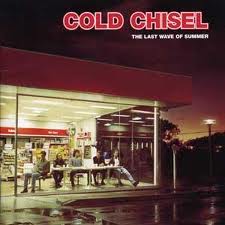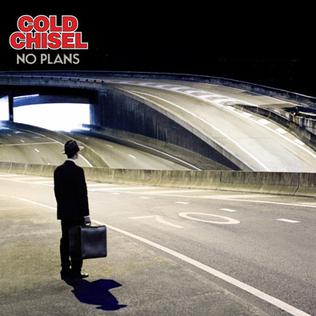
Cold Chisel are an Australian pub rock band, which formed in Adelaide in 1973 by mainstay members Ian Moss on guitar and vocals, Steve Prestwich on drums and Don Walker on piano and keyboards. They were soon joined by Jimmy Barnes on lead vocals and, in 1975, Phil Small became their bass guitarist. The group disbanded in late 1983 but subsequently reformed several times. Musicologist Ian McFarlane wrote that they became "one of Australia's best-loved groups" as well as "one of the best live bands", fusing "a combination of rockabilly, hard rock and rough-house soul'n'blues that was defiantly Australian in outlook."

"Khe Sanh" is the debut single by Australian rock band Cold Chisel, released in May 1978 as a 45 rpm single, and named after the district capital of Hướng Hóa District, Quảng Trị Province, Vietnam. Written by pianist Don Walker, "Khe Sanh" concerns an Australian Vietnam veteran dealing with his return to civilian life. According to Toby Creswell's liner notes for the band's 1991 compilation album Chisel, the song is also a story of restless youth.

"Flame Trees" is a song by Australian pub rock band Cold Chisel from their 1984 album Twentieth Century. One of their best known songs, it was written by drummer Steve Prestwich and keyboardist Don Walker. On its release it reached No. 26 on the Kent Music Report Singles Chart. It resurfaced in August 2011 due to download sales, peaking at No. 54 on the ARIA chart.

The Last Wave of Summer is the sixth studio album by Australian pub rock band, Cold Chisel. It was released in October 1998 and reached number-one on The Australian ARIA Charts. It was the band's first studio album in 14 years.

Breakfast at Sweethearts is the second studio album by Australian pub rock band Cold Chisel, released in February 1979. It spent 32 weeks in the national charts, reaching a peak of number 4.

You're Thirteen, You're Beautiful, and You're Mine is a live EP by Australian pub rock band Cold Chisel, recorded at the Regent Theatre in Sydney in October 1978, and released in November. After a long period of unavailability, the EP was re-released as a bonus disc with the second pressing of the compilation album Chisel (1991). The EP was later made available digitally, as well as reissued on disc in 2011.

East is the third studio album by Australian pub rock band Cold Chisel, released in June 1980. The album peaked at No. 2 and spent 63 weeks on the national chart. It was the biggest-selling Australian album release of the year. It was the only Cold Chisel album to chart in America, reaching 171 on the Billboard 200. It also reached number 32 on the New Zealand charts.

Circus Animals is the fourth studio album by Australian band Cold Chisel, released on 8 March 1982. It was recorded and mixed at Paradise Studios and EMI Studios 301, Sydney, between September and December 1981. It reached number one on the Australian charts, remaining in the charts for 40 weeks, and also topped the New Zealand charts. The working title for the album was "Tunnel Cunts".

Swingshift is a live album released by Australian band Cold Chisel in 1981. It was their first album to reach No. 1 on the Australian chart, debuting there in its first week. It peaked at number 9 in New Zealand. A press release said the title referred to, "the midnight to dawn shift that the staff in asylums dread: the hours when the crazies go crazy."

Twentieth Century is the fifth and final studio album by Australian band Cold Chisel until the group reformed in 1998. The album was written and recorded over various sessions during the period of the band's break-up and during breaks in their final tour. It was released in early 1984 and peaked at No. 1 on the Australian albums chart, their third consecutive album to do so. It charted for a total of 46 weeks.

Flesh and Wood is the seventh album by Australian rock singer Jimmy Barnes, which was issued in December 1993. It was recorded by Barnes and Don Gehman co-producing and used only acoustic instruments. On eight of its fifteen tracks, Barnes duets with various artists: Diesel, Archie Roach, Joe Cocker, Ross Wilson, Tommy Emmanuel, Don Walker, Deborah Conway, and the Badloves. It reached No. 2 on the ARIA Albums Chart.

"You Got Nothing I Want" is a 1981 single from Australian rock band Cold Chisel, the first released from the album Circus Animals. One of the band's heaviest and most aggressive songs, it was written by singer Jimmy Barnes in response to the treatment they received at the hands of a record company executive during a U.S. tour earlier in the year. Don Walker said, "After we came back, Jim wrote 'You Got Nothing I Want' more or less as a personal tribute to Marty Schwartz." "You Got Nothing I Want" was also the first song on the album and representative of the different sound Cold Chisel was attempting on Circus Animals in a conscious effort to move away from the slick commercial pop rock of East. It spent 19 weeks in the national charts, peaking at number 12.

Teenage Love is a compilation album by Australian pub rock band Cold Chisel, released in 1994. The album collected studio recordings, many just demos, that were not used on previous albums. Phil Small said, "There was always a surplus of 3 to 4 tracks with each album." The tracks were recorded between 1976 and 1983. "Hands Out of My Pocket", "Nothing But You" and "Yesterdays" were issued as singles.

"Choirgirl" is a song by Australian rock band Cold Chisel, released as the lead single from their third studio album East (1980) in November 1979. A ballad written by Don Walker with an R&B influenced melody, the song marked the first time the band had recorded with producer Mark Opitz. It peaked at No. 14 in Australia on the Kent Music Report.

"Forever Now" is a song by Australian rock band Cold Chisel. The second single from the album Circus Animals, it was the first Cold Chisel single to be written by Steve Prestwich. The song reached number two in New Zealand and number four in Australia, becoming the band's highest chart placement. In the United States, the song was titled "Forever Now ".

No Plans is the seventh studio album by Australian rock band Cold Chisel. It was released on 6 April 2012 and was the band's first studio album in 14 years. It features the final recorded performances by drummer Steve Prestwich, who died of a brain tumour in January 2011. The album peaked at number 2 on the Australian charts.

Ringside is a live album released by Cold Chisel in 2003. Recorded over 4 nights in June 2003, it peaked at number 27 in 2003 and peaked at number 16 following its vinyl release on 12 November 2021.

"Cheap Wine" is a 1980 single from Australian rock band Cold Chisel. The second single from the album East, it was released in May, a month before the album. It reached number 8 on the Australian charts, the band's first top-ten single, and would eventually remain the band's second highest chart performance. It has been described as, "one of Don's finest commercial songs."
"Goodbye " is a 1978 single from Australian rock band Cold Chisel. Written by keyboardist Don Walker and vocalist Jimmy Barnes, it was released as a single in 1978, peaking at number 65 on the Australian charts. It appeared as a track on the 1979 album Breakfast at Sweethearts.

The Perfect Crime is the eighth studio album by Australian rock band Cold Chisel. It was released on 2 October 2015. It was the first album not to feature a contribution from drummer Steve Prestwich, who died of a brain tumour in January 2011. The album peaked at number 2 on the Australian charts and number 7 in New Zealand.



















